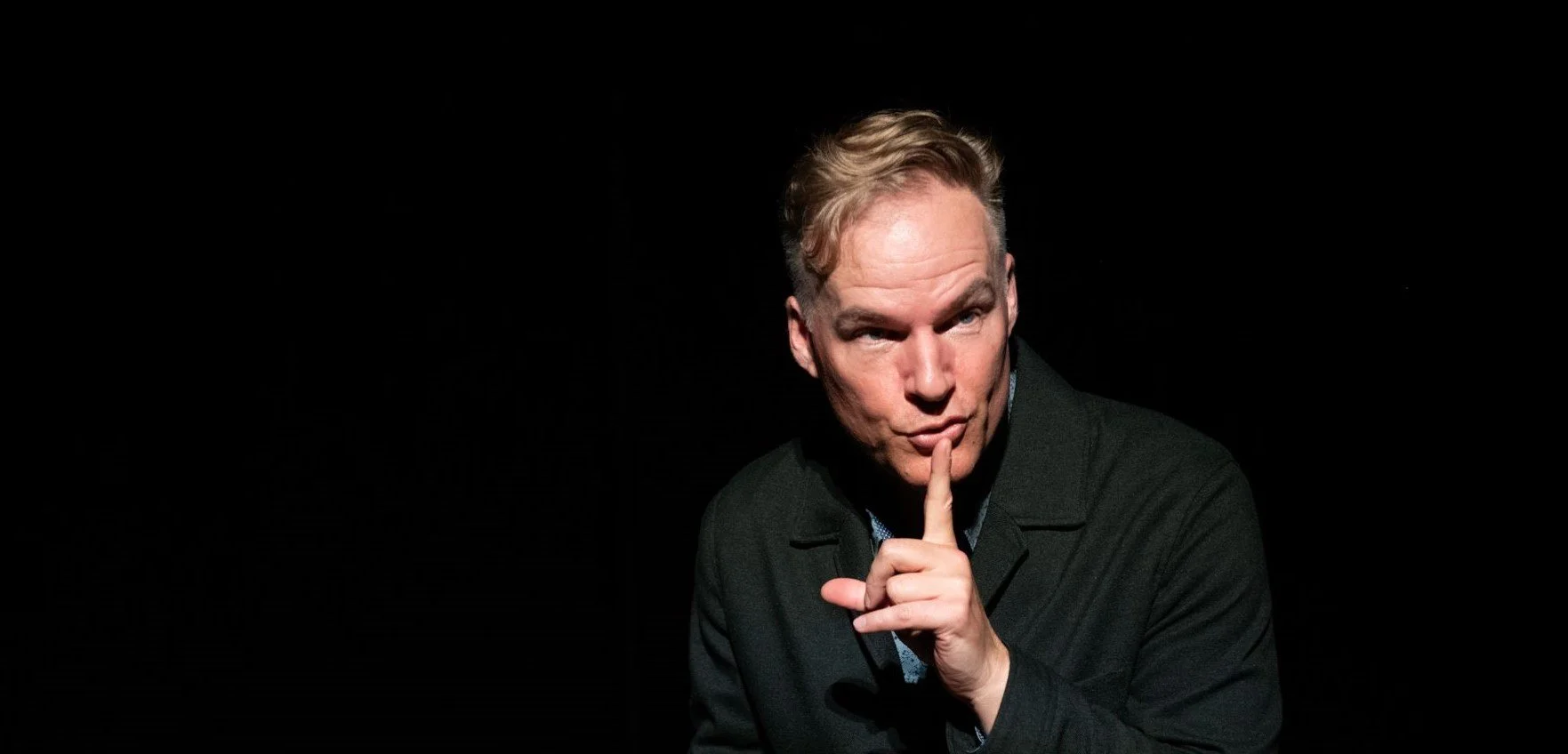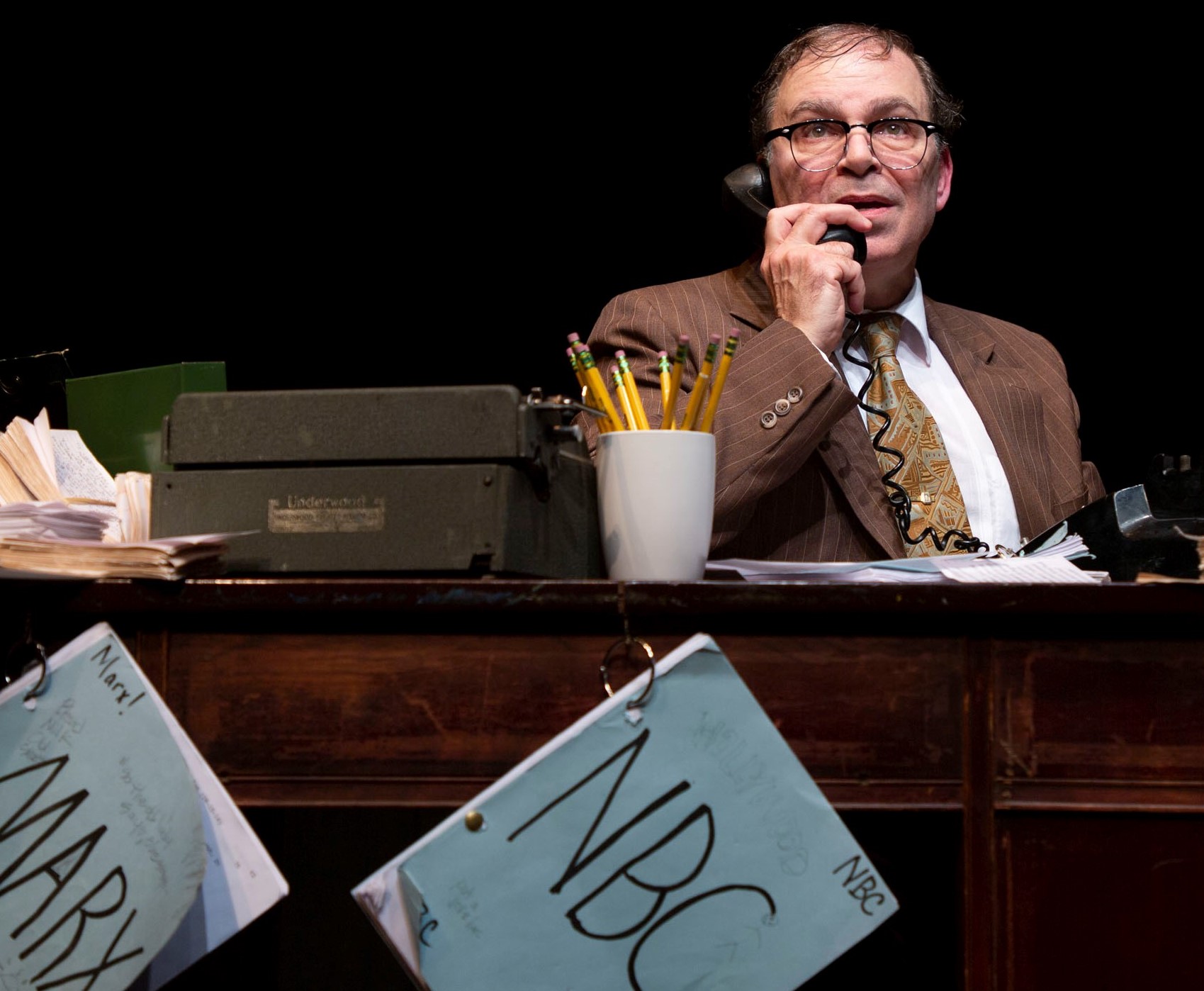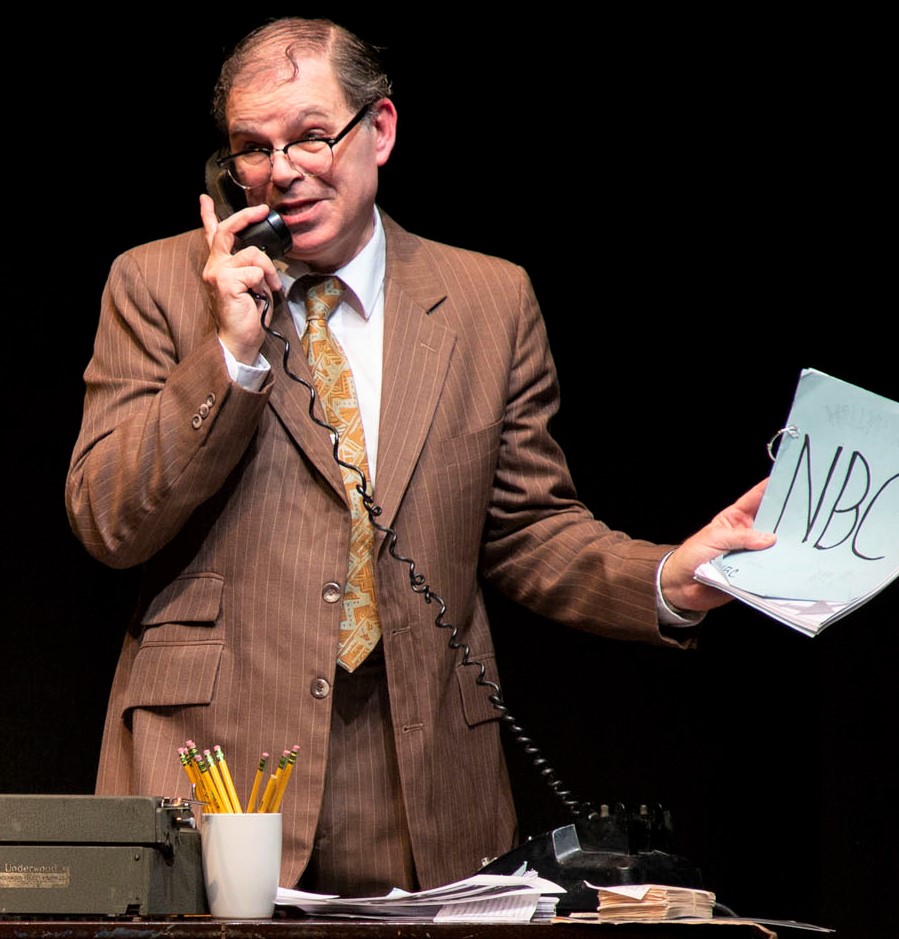That Parenting Musical, written by real-life mom-and-dad team Graham and Kristina Fuller, is a show that whimsically explores the ups and downs of parenting. Breezily directed and choreographed by Jen Wineman, it is two hours of rib-tickling fun.
The Actors
Boundaries of all types are tested in Ronnie Larsen’s comedic and big-hearted family chronicle, The Actors. The line between Democrat and Republican is pulled taut, as is the division between atheist and religious believer. But those are relatively minor concerns for the playwright. More to the point are the boundaries of grief and how to break through them, the borders of what constitutes a family, and what limits stage actors might burst through when their roles take over their lives. As farcical as it is melancholy, there are as many surprise door knocks in the play’s two acts and two hours as there are woeful revelations.
This Is Not a Time of Peace
The personal is political. This familiar adage is one of the points Deb Margolin makes in the awkwardly staged and often pretentious-sounding play This Is Not a Time of Peace. Other points: History repeats itself. We are the sum total of everything we’ve experienced. Beware despots. Professional ambition can clash with personal ethics. Time does not heal everything. Trumpism equals McCarthyism.
’Til Death
Watching somebody you love die is terrible. Watching somebody you don’t care about die is a whole other type of painful—one you can experience at ’Til Death, a muddled new drama in which the estimable Judy Kaye plays terminal cancer patient Mary Gorman.
Arms and the Man
Gingold Theatrical Group (GTG) is back at Theatre Row with Bernard Shaw’s 1894 comedy Arms and the Man, directed by David Staller. In the 17 years since its founding, GTG has presented all 65 of Shaw’s plays in full productions or staged readings at least once (generally with élan), and Staller has become our nation’s foremost Shavian outside academia.
Chasing Happy
Chasing Happy, a new play by Michel Wallerstein, takes its name from the title of a best-selling, posthumously published book by John Ryan, the late partner of the play’s main character, Nick. John was killed by a gunman at a Pride parade, a crime that Nick calls “random.” Based on the excerpts Nick reads from the memoir cum self-help tome, John—who was born post-Stonewall and lived in Provincetown, Mass.—was wracked with self-loathing and shame about his homosexuality and remained closeted with many people. His book offers such banal affirmations as “I exist, I am worthy, I am love” and “Let me become who I truly am.” (Another character describes it as “one big stew of Deepak Chopra, Marianne Williamson and Eckhart Tolle, mixed with some gay cliché stuff.”)
The Lights Are On
In addition to crafting an engrossing thriller, dramatist Owen Panettieri shows a gift for prognostication with The Lights Are On. He wrote the play before the pandemic—it had been set for a fall opening in 2020 when COVID shut down all theater—yet it has a character who hoards toilet paper and face masks, wipes down the groceries and stays home all the time.
In Corpo
Ben Beckley and Nate Weida’s In Corpo is a new sci-fi musical about human connection that will make some theatergoers smile and others wince. Directed by Jess Chayes, it draws on Franz Kafka’s unfinished novels The Castle and The Trial, Herman Melville’s short story “Bartleby the Scrivener,” and the artists’ own experiences navigating the corporate world. The piece grapples with corporate overreach, invasive technologies, and unresponsive bureaucracies to satirize how working in the corporate world can stymie one’s heart and soul. Its principals’ names, “K” and “Bartleby” (played by Austin Owens Kelly), are borrowed directly from Kafka (K. is the hero of The Castle; Josef K. of The Trial) and Melville’s 1853 short story.
Robin and Me: My Little Spark of Madness
Dave Droxler makes his living as an actor and voice-over artist, but he is also a gifted impressionist. His 2016 New York Fringe Festival show, Walken on Sunshine, was built around his masterly impersonation of Christopher Walken. Now Droxler has written a solo play, Robin and Me: My Little Spark of Madness, that showcases his equally spot-on impression of his idol Robin Williams.
Candida
It’s been 128 years since George Bernard Shaw penned Candida as an ironic commentary on Henrik Ibsen’s A Doll House. But the play is seldom staged, which is a pity because, as David Staller’s new adaptation shows, this 1895 feminist comedy is a gem. Staller has transported the play from the northeast suburbs of 19th-century London to Harlem in 1929. While some theatergoers might miss the British flavor of Shaw’s original text, Staller’s version brings New York grit to the drama.
The Near Disaster of Jasper & Casper
It can’t be easy to invent a brand-new fairy tale; even James Lapine and Stephen Sondheim had to rely on the old favorites. But here comes Jason Woods, not only cobbling together an entirely original fantasy with The Near Disaster of Jasper & Casper, but performing all the parts, with distinctive voices and personalities for all the characters. Woods may seize on some familiar plot points, and he’s not always tidy: “Jasper and Casper” don’t rhyme perfectly with “Disaster,” as he seems to have been aiming for. But he knocks himself out to engage the audience.
Mr. Parker
In the 1950s Paddy Chayefsky wrote a successful drama, Middle of the Night, in which nobody could understand what a young Gena Rowlands could see in an old Edward G. Robinson. Or, in the movie version, what Kim Novak could see in Fredric March. That quandary is back, after a fashion, with Mr. Parker, Michael McKeever’s sort-of-new drama (it premiered in Florida in 2018). Only this time it’s hard to see what Davi Santos sees in Derek Smith.
Blues for an Alabama Sky
Blues for an Alabama Sky, by Pearl Michelle Cleage, has been around for 25 years, but only now has the Keen Company given it a New York debut. Still, Cleage’s work, about black artists struggling in 1930, during the Harlem Renaissance, is as relevant today as it was a quarter-century ago. Poverty, discrimination, abortion rights, violence, and the everyday hustle to make it are still real issues in 2020.
Felix Starro
The decision to avoid going into the family business can be a wise one, especially if that business involves the questionable practice of psychic healing. However, if that choice also means surrendering not only the family name, but one’s entire identity, then scamming the sick and elderly might seem to hold merit. Such is a young man’s quandary in Felix Starro, the sincere and split-focus new musical by Jessica Hagedorn and Fabian Obispo that opens the Ma-Yi Theater Company’s 30th anniversary season. Under the direction of Ralph B. Peña, this nearly two-hour dive into the meaning of faith is the first musical created by Filipino Americans to appear Off-Broadway.
A Jewish Joke
A Jewish Joke is a one-man show about partnerships, but that is just one of its several paradoxes. The play explores Jewish comedy, though from the serious viewpoint of its effect during the era of the Hollywood blacklist, when humor could either get a guy out of a jam, or reinforce anti-Semitic stereotypes. Many old jokes are told during the 90-minute production; however, they are delivered with such odd undertones that it is impossible to tell whether director David Ellenstein was hoping for legit laughter or uncomfortable sighs from the vintage zingers that are rife with sexism and prejudice. And Joke is a play about writing which, when it falters, does so because the script is, at times, contrived or repetitious. When it succeeds, it does so because Phil Johnson, of San Diego’s Roustabouts Theatre Company, so fully inhabits his role that his character’s stressed-out persona transcends the page.
Phil Johnson as Bernie Lutz in A Jewish Joke, written by Johnson and Marni Freedman.
Johnson portrays Bernie Lutz, a film writer for MGM Studios in its mid-20th-century heyday. Though successful at his craft, he looks the worse for wear. His sad brown suit is wrinkled, his tie atrocious, his eyeglasses cheap, and his limp comb-over barely covers his scalp. He would be considered Kafkaesque, except that on this particular morning he finds he has been transformed into, not a cockroach, but a commie. His name, along with that of his lifelong friend and writing partner, Morris Frumsky, have turned up in Red Channels, the right-wing publication that, in 1950, accused scores of entertainers and journalists of having ties to the Communist Party (Real-life names cited by Red Channels ran the artistic gamut from Orson Welles to Dorothy Parker to Leonard Bernstein.).
It seems Morris had recently taken Bernie to a soirée that was more than just the cocktail-weenie extravaganza Bernie thought it to be. The fact that Morris is nowhere to be found as the play begins, despite the fact that their latest flick, The Big Casbah, is set to premiere that very evening, telegraphs all we need to know about Bernie’s impending doom. But Johnson, who co-wrote the piece with Marni Freedman, walks us through Bernie’s very bad day nonetheless. First, it turns out that the government had sent him a warning letter regarding the “important work of investigators under Senator Joseph McCarthy,” but he conveniently had torn it into three pieces without bothering to read it, allowing him to now build tension by slowly finding each section amid the piles of crumpled papers strewn about his bungalow. Then his colleagues begin disassociating. Danny Kaye shows him the door. Louis B. Mayer has no time for him. And when Harpo Marx gives him the silent treatment, he reaches a crisis point: testify against Morris to clear his own name, or protect his pal and risk sacrificing his career.
Bernie treads the fine line between comedy and tragedy. Photographs by Clay Anderson.
Without other characters in the room to play against, Bernie frequently turns to the audience and tells one of the many off-color gags he has collected on index cards. Most are groaners and, whether meant to be awful or not, they do keep the audience from becoming too emotionally caught up in Bernie’s dilemma. It’s the old “alienation effect,” a technique pioneered by another member of the Hollywood blacklist, Bertolt Brecht.
Bernie also has framed pictures of his wife and his parents with which to interact. But mostly, he is on the phone. Indeed, the plot revelations are entirely dependent on the seemingly endless number of calls that Bernie makes and receives. The playwrights employ a couple of devices to minimize the drudgery. Rather than repeatedly having to dial the rotary phone, Bernie has an unseen secretary place his calls. Somehow, she is able to do so with lightning speed, adding a surreal aspect to the evening. And Bernie answers the phone each time with a different one-liner (“Bernie’s Yacht Club”). None are particularly funny, but it beats enduring a hellacious string of hellos.
Production supervisor/designer Aaron Rumley provides a desk for Bernie to work behind, and I will just assume that its drawers are full. Why else install hooks across the front of it and glaringly hang from them the scripts that Bernie risks forfeiting? Regardless, Johnson, who has been touring and perfecting this role since 2016, when the show won Best Drama at the United Solo Fest NYC, makes it work, taking his character’s motto to heart: “When there is no mensch, be the mensch.”
A Jewish Joke, by Marni Freedman and Phil Johnson, runs through March 31 at The Lion Theater (410 W. 42nd St.). Evening performances are at 8 p.m. Wednesdays through Saturdays; matinees are at 3 p.m. Sundays. For tickets, call Telecharge at (212) 239-6200 or visit ajewishjoke.com.
Ordinary Days
The trials and tribulations of living in New York City are explored in Ordinary Days, a sweet and thoughtful musical exploring the alternating wonder and frustration of life in the Big Apple. Currently being presented by Keen Company at Theatre Row, Ordinary Days chronicles four New Yorkers in 2007 as they navigate their everyday lives while pondering their larger futures.
Attack of the Elvis Impersonators
Attack of the Elvis Impersonators, at the Lion, has no subtitle, so here’s a helpful suggestion: The Attention Deficit Disorder Musical. Lory Lazarus, who perpetrated book, music, and lyrics, just staggers from premise to premise, seizing on some new plot point and leaving whole subplots behind to die of malnutrition. Some of them contain good ideas. More don’t.
Festival to have two-month run
The 2017 United Solo Theatre Festival, the world’s largest festival of solo performances, will be held at Theatre Row (410 W. 42nd St. between 9th and 10th avenues in the studio theater) from Sept. 14 to Nov. 19. The festival presents renowned artists and new talents featured in local and international shows. Performance genres range from drama, storytelling, puppetry, and multimedia shows to stand-up, magic, improvisation, dance, and musical. For tickets ($37.50) and information visit http://unitedsolo.org/us/ufest/.
Orion
Orion, a new play by Matthew McLachlan and directed by Joshua Warr, opened on Valentine’s Day, but the theatrical lovefest dishes out more than sweet nothings. Indeed, this playwright’s first full-length production serves up handfuls of hearty truths.
tick, tick...BOOM!
For the late Rent composer Jonathan Larson, the “tick, tick, boom” in his head were the sounds signaling the passage of time as he matured and yet struggled to achieve success in the theater. Although Tick, Tick… BOOM! was originally written as a highly autobiographical solo piece, it was reworked after Larson’s death and the success of Rent to include two more characters, a girlfriend and a roommate. Fans of his 1996 hit rock musical are likely to thoroughly enjoy the Keen Company production of Tick, Tick… BOOM!


























